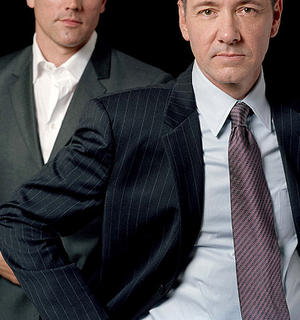 Last night Eyewear attended the Old Vic's new production (directed by Trevor Nunn) of Richard II, with Kevin Spacey as Richard, and Ben Miles as the usurper. It was extraordinary. The modern-dress setting was perhaps too busy with the usual tropes of cameras and cell phones as imagos of a post-modern world, but the stark crisis between godly tradition and naked power was well presented even in contemporary fashion (the play partly being about fashion of course). Kevin Spacey has never been better, and lent Richard a few extra layers of pathos and eloquence, as well as suavity and cattiness, beyond the usual ones of self-pity and preening vanity stripped bare like a winter tree.
Last night Eyewear attended the Old Vic's new production (directed by Trevor Nunn) of Richard II, with Kevin Spacey as Richard, and Ben Miles as the usurper. It was extraordinary. The modern-dress setting was perhaps too busy with the usual tropes of cameras and cell phones as imagos of a post-modern world, but the stark crisis between godly tradition and naked power was well presented even in contemporary fashion (the play partly being about fashion of course). Kevin Spacey has never been better, and lent Richard a few extra layers of pathos and eloquence, as well as suavity and cattiness, beyond the usual ones of self-pity and preening vanity stripped bare like a winter tree.Ben Miles was a revelation - a bold modernizer out to capture his country like some former-day Cameron or Fox (or Blair). The play itself, delivered with such passion and seriousness, is newly-minted as one of Shakespeare's greatest and most profound essays on being and identity itself - the soul being appeased by "being eased to being nothing" - and Spacey's soliloquies with the mirror and in the cell were arresting and ravishing.
At the bleak end, when the brilliant, poetic king is grossly murdered, one is struck by the play's underpinning subtext: that the poet in society is disposable, no match for a determined forceful march forward - for all of Richard's speeches, which fuse his sense of self with tradition and language, ultimately link him to the royal fabric of spoken thought itself, which is, finally (and finely) poetry.
Comments